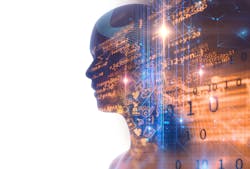As if manufacturers didn’t already have enough on their hands trying to find suitable applicants for their shop floors and R&D departments, the world of artificial intelligence is about to explode onto the scene. And when it does, the scramble for talent will only grow maddeningly tougher.
This may sound like trouble, but there’s a tremendous upside. According to a newly released study by the MAPI Foundation and the Information Technology and Innovation Foundation (ITIF), not only will AI enable machines to do a lot more—but it will also empower humans to do a lot more as well. That means an upsurge of new kinds of jobs related to developing new AI solutions, leading new AI business strategies and supervising AI implementations.
And no sector will be more affected than manufacturing.
Why the dramatic change in this particular sector? Manufacturing already has a substantial value chain more complex than other sectors. In the coming decade, it’s going to get even more complicated, with countless products and processes incorporating AI to create smart factories, integrate supply chains and develop more customer-friendly distribution and sales chains. Manufacturers already deploy AI in industrial robotics and cobots, and new adaptations such as machine vision, intelligent products and machine learning are being introduced at an accelerating pace. In the coming years, industry leaders also expect significant growth in their use of AI in predictive systems in their equipment and the management of intelligent supply chains, as well as a significantly increased use of robotic process automation (RPA).
Such an evolution will necessitate the creation of a variety of new AI-related jobs, filled by workers with AI-related skills. Some of these jobs are already in the labor pool. According to the report, well over a third of manufacturers already have created the positions of “data scientists” and “data quality analysts” in their workforces, with another third expecting to do so in the near future. Considering the level of data delivered through AI-enabled sensors and machine learning, one can imagine this job title one day becoming as ubiquitous in the workforce as mechanical engineers. There has also been an escalation in the number of “machine learning engineers” and “machine learning specialists,” with two-thirds of manufacturers expecting to add this role in the next five years.
And this is just the tip of the iceberg. As manufacturing shop floors, supply chains, and aftermarket services grow in complexity, management will divvy up the workload for humans and machines based on the relative qualifications of each. In some roles, such as those requiring creativity and judgment, humans will reign supreme. In other areas, such as the role of predicting and iterating (i.e., repeating processes), machines will be in charge.
But perhaps most important in the coming years will be a growth in hybrid roles, which will require “fusion skills” that build on the combination of human and machine talents to create better outcomes to either working independently. Such skills will be needed in manufacturing facilities when humans have to train, explain and sustain activities to enable machines to move forward. Fusion skills will also be needed to extend employees’ capabilities, such as when machines enable humans to make key decisions. Finally, such skills will be needed for tasks in which humans and machines work and excel together, such as iterative processes in which each learns from the other as they repeat tasks.
That’s where the talent gap rears its ugly head. In terms of developing an AI-savvy workforce that can develop new AI solutions, lead new AI business strategies, and supervise AI implementations, the report notes that a sizable percent of manufacturers require more technically trained applicants than are available—all competing with each other for the talent. Manufacturers see the biggest barrier arising from educational institutions failing to generate a sufficient number of graduates with the needed knowledge and skills. In other words, we’re not churning out workers who are readily prepared for the modern workplace.
This isn’t new: the STEM gap is well documented over the past decade. But the more digitalized manufacturing becomes, the bigger this gap will grow—unless companies and educational institutions work together to close it. Some are. More than half of those surveyed expect over the next five years to pursue a combination of retraining and hiring employees with the needed AI/data science skills. Another third are building relationships with local educational institutions such as high schools, community colleges, and trade schools. Finally, 20% are starting to offer online training (through, for example, Massive Open Online Courses, or MOOCS) and internal training courses for AI skills.
These are critical strategies for manufacturers. Because AI is disruptive, but it’s not destroying jobs. It’s creating new ones.
Stephen Gold is president and CEO of MAPI, the Manufacturers Alliance for Productivity and Innovation.
About the Author

Stephen Gold
President and Chief Executive Officer, Manufacturers Alliance
Stephen Gold is president and CEO of Manufacturers Alliance. Previously, Gold served as senior vice president of operations for the National Electrical Manufacturers Association (NEMA) where he provided management oversight of the trade association’s 50 business units, member recruitment and retention, international operations, business development, and meeting planning. In addition, he was the staff lead for the Board-level Section Affairs Committee and Strategic Initiatives Committee.
Gold has an extensive background in business-related organizations and has represented U.S. manufacturers for much of his career. Prior to his work at NEMA, Gold spent five years at the National Association of Manufacturers (NAM), serving as vice president of allied associations and executive director of the Council of Manufacturing Associations. During his tenure he helped launch NAM’s Campaign for the Future of U.S. Manufacturing and served as executive director of the Coalition for the Future of U.S. Manufacturing.
Before joining NAM, Gold practiced law in Washington, D.C., at the former firm of Collier Shannon Scott, where he specialized in regulatory law, working in the consumer product safety practice group and on energy and environmental issues in the government relations practice group.
Gold has also served as associate director/communications director at the Tax Foundation in Washington and as director of public policy at Citizens for a Sound Economy, a free-market advocacy group. He began his career in Washington as a lobbyist for the Grocery Manufacturers of America and in the 1980s served in the communications department of Chief Justice Warren Burger’s Commission on the Bicentennial of the U.S. Constitution.
Gold holds a Juris Doctor (cum laude) from George Mason University School of Law, a master of arts degree in history from George Washington University, and a bachelor of science degree (magna cum laude) in history from Arizona State University. He is a Certified Association Executive (CAE).
